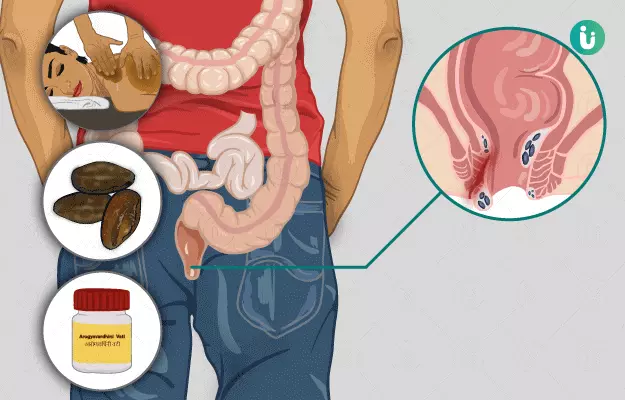Fistula-in-ano is a condition, in which, abscesses form near the rectum or anus and become infected and filled with pus. About 90% of the people with fistula experience boils due to severe infection in the internal tissues of the anus. According to Ayurveda, a fistula is termed as bhagandar, with symptoms such as severe pain in the bhag (perineum), basti (pelvis) and guda (anal canal). A pidika or boil around the perianal region bursts and becomes a pus-discharging tract, which further leads to bhagandar, if not treated on time.
Bhagandar is a madhyama rogamarga disease (a disease caused in the internal and medial pathways of the body) and is mentioned under the group of ashta mahagada (eight incurable diseases) in Ayurveda. It is said to be a disease that is difficult to cure. Ksharasutra (Ayurvedic cutting seton) is a recommended and successful Ayurvedic therapy that has been extensively used for fistula treatment. Aragvadha (golden shower), haritaki (chebulic myrobalan), and triphala (a combination of amalaki [Indian gooseberry], vibhitaki [belleric myrobalan], and haritaki) are some of the herbs used to treat fistula in Ayurveda. Various herbal formulations including arogyavardhini vati, triphala guggulu and abhayarishta are also used along with herbs to improve overall health and heal the abscesses. Including fruits and vegetables in daily meals and making lifestyle changes by avoiding excess physical activities such as walking, playing outdoor games, etc., helps manage a fistula better.
- Ayurvedic view of fistula
- Ayurvedic treatment for fistula
- Ayurvedic herbs and medicines for fistula
- Dietary and lifestyle changes for fistula patient as per ayurveda
- How effective are ayurvedic medicines and treatments for fistula
- Side effects and risks of ayurvedic medicine and treatments for fistula
- Takeaway
Ayurvedic view of fistula
According to Acharya Charaka, factors like asthi kshanan (injury to the bones), straining during defecation, utktasana (a squatting yogasana), and krimi bhakshan (infections by micro-organisms) vitiate the doshas in the body and cause boil formation in the perianal region, which later suppurates and bursts and leads to bhagandar. As per Acharya Sushruta, the six stages of fistula are:
- Sanchaya (accumulation of doshas at the site of the fistula)
- Prakopa (aggravation stage)
- Prasara (propagation stage)
- Sthana sanshraya (localisation stage)
- Vyakti (manifestation stage)
- Bheda (complication stage) – this stage reveals the commencement and progress of the disease.
Ayurvedic texts also categorised fistula into different types as follows:
- Shatponak (vataja – caused due to vitiation of vata): A fistula with many openings
- Parisraavi (kaphaja – caused due to vitiation of kapha): A fistula with a big cavity and profuse discharge
- Unmargi (kshataja): A fistula caused due to trauma.
- Ushtagreev (pittaja – caused due to vitiation of pitta): A fistula that appears like the neck of a camel
- Shambukavarta (sannipataja – caused due to vitiation of all three doshas): A fistula that appears like a horseshoe
The sannipataja type of fistula is said to be incurable.The vataja, kaphaja and pittaja types of fistulae, although difficult to treat, are curable.
Ayurvedic treatment for fistula
- Ushnodaka avagaha (hot sitz baths)
- Ushnodaka avagaha is a process in which individuals are asked to bathe with warm water for a long time. Water that is pure and light, devoid of froth or foam, is boiled to half, 1/3rd or 1/4th of its volume depending on the season and the desha (geographical location) in which the person resides and is used for sitz bath.
- A sitz bath is performed for cleansing and achieving relief from problems in the genital, perineal (the area between the vulva and the anus in women and the area between the scrotum and anus in men) and anal area. This therapy relaxes muscles and improves blood flow in these areas.
- A sitz bath is performed using a bathtub (a clean bathtub filled with three to four inches of water) or a sitz bath bowl (a plastic bowl firmly placed on the rim of the toilet seat).
- Herbal formulations or herbs are added to the warm water based on the condition. About 100 mL of panchavalkala or triphala kwatha (decoction) is added to the sitz bath for people with fistula. The bath is usually performed for about 10 to 20 minutes twice a day. Jatyadi taila (oil) is applied to the anal area after every sitz bath.
- Shastra karma (surgical procedure)
- Shastra karma is adopted as a pradhana karma (main treatment) in many conditions. Chedana (incision), eshana (probing), lekhana (scraping) and bhedana (incision made to open a cavity in the body) are some of the surgical methods performed in Ayurveda. Chedana karma is performed in people with fistula.
- Surgery is done at the pakwa pidika (suppurating boil) stage. Before the surgery, swedana (sudation or sweat therapy) and snehana (oleation) are performed on the pidika. The pakwa pidika is then incised and drained from the most dependent and prominent part.
- A fistulectomy (total removal of the tract) may also be performed in some people.
- Ksharasutra chikitsa
- A ksharasutra is a medicated and sterilised thread that is repeatedly coated with alkaline herbal medicines. Ksharasutra is a parasurgical procedure that has been the main treatment of fistula as this therapy guarantees a low recurrence rate. It is known as a chemical and minimally invasive fistulectomy, unlike the invasive surgical fistulectomy.
- It is performed using haridra (turmeric), snuhi ksheera (latex of the snuhi [Indian spurge] tree), arka ksheera (latex of the arka [crown flower] tree), and other herbs.
- Ksharasutra does not require hospitalisation as it is an outpatient procedure. There are minimum scars and no damage to the anal sphincter.
- Lepa (coating the affected body part with medications)
- A lepa is a medicated plaster prepared from herbs, which is applied against the direction of the hair on areas that are swollen and inflamed. Doshagna (lepa to reduce the doshas), varnya mukhalepa (cosmetic lepa) and vishaghna (poison-removing lepa) are the three types of lepa in Ayurveda.
- The area affected with the fistula is washed with triphala kwatha, and dasanga lepa with ghrita (clarified butter) is applied on fistula boil. A mixture of tila (sesame seed), nimba leaves (Indian lilac), yashtimadhu (mulethi) root and other herbs is made into a lepa to apply on the fistula ulcer.
Ayurvedic herbs and medicines for fistula
Ayurvedic Herbs for Fistula
- Haritaki
- Haritaki has expectorant (expels mucus), tonic, nerve-calming and rejuvenating properties. It is known to work on the digestive, reproductive and excretory systems. Haritaki is used to treat many conditions such as piles, ulcerated gums, itching, sore throat, diarrhoea and cough. It is externally used for burns, swellings, scalds, and skin diseases caused due to vata.
- It is available in the form of gargles, decoction, pastes or powder. You can take haritaki churna with lukewarm water or as per your physician's direction.
- Haritaki has tridoshaghna (pacifying all three doshas, especially vata) properties and wound-healing and cleansing properties that make it useful in treating a fistula. It also has mild purgative, digestive, anthelminthic, anti-inflammatory and laxative properties, which provide relief from constipation.
- Aragvadha
- Aragvadha has anti-fungal, anti-viral, anti-microbial, anti-parasitic, and anti-diabetic properties. The wound healing and anti-inflammatory properties of aragvadha make it useful in the treatment of a fistula.
- The anti-oxidant properties of aragvadha help maintain overall health and wellness. It also protects the body from degenerative and chronic diseases.
- You can take aragvadha churna with lukewarm water or as per your physician's direction.
- Triphala
- Triphala is a traditional Ayurvedic formulation that is rich in antioxidants. It is most commonly used to treat asthma, anaemia, chronic ulcers, fever and constipation. It is primarily a rasayana (rejuvenatives) medicine.
- Triphala improves longevity, immunity and promotes health. It detoxifies and tones the whole body. Triphala also cleanses the gastrointestinal tract and improves assimilation and digestion. Its antibacterial, anti-allergic, antifungal and anti-viral properties protect the body from infections and allergies, therefore, helping prevent fistula ulcers and infections.
- You can take triphala churna with lukewarm water or as per your physician's direction.
- Kṛiṣhṇa tila (black sesame)
- Krishna tila is used in Ayurveda to promote hair growth, intelligence and increase bala (strength) in the teeth and body.
- It helps reduce urine output, constipation and vata levels in the body. It acts as an emollient for the skin and improves appetite.
- This herb has potent wound-healing properties that are helpful in the management of fistula. You can take black sesame oil with milk or as per your physician’s direction.
Ayurvedic Medicines for Fistula
- Triphala guggulu
- Triphala guggulu is a mixture of triphala, trikatu (three acrids – pippali [long pepper], shunthi [dried ginger] and maricha [black pepper]), and guggulu (Indian bdellium-tree).
- Triphala guggulu is used for osteoporosis, urinary problems, osteoarthritis, urustambha (painful stiff thighs), and fistula. It reduces vata in the body. The anti-inflammatory activity of triphala guggulu is useful in achieving relief from pain and inflammation that may arise after the shastra karma or ksharasutra treatment for fistula.
- You can take triphala guggulu vati (tablets) with lukewarm water or as per your physician’s direction.
- Abhayarishta
- Arishtas are herbal decoctions that are prepared by boiling herbs. Abhayarishta is a mixture of chavak (choi jal), gokshura (small caltrops), shunthi, dantimool (wild castor roots) and other herbs.
- Abhayarishta brings the peristaltic movements of the intestine into balance and helps reduce constipation. As it treats constipation, it reduces the pressure on the anal sphincter, thus providing relief to those with fistula. It also removes ama (toxins) from the body through faeces and treats digestive diseases.
- When given with ghrita, it lubricates intestines.
- You can take abhayarishta with an equal quantity of water or as per your physician's direction.
- Arogyvardhini vati
- As the name suggests, arogyavardhini vati aims at being a vardhini (improver) for the arogya (health) of an individual. This medicine balances all three doshas in the body.
- Arogyavardhini vati acts as a carminative and appetite promotor, thus improving digestive functions. It helps with indigestion and improves bowel movements, thus providing relief from constipation and other bowel problems in people with a fistula. It also improves appetite
- Herbs like haritaki present this formulation act as a laxative, thus helping in the easy passing of stools in people with fistula.
- You can take arogyavardhini vati with lukewarm water or as per your physician’s direction.
As treatments vary according to numerous factors and an individual’s prakriti (constitution), consult a qualified Ayurvedic doctor for the appropriate medications and treatments for your specific complaints.
Dietary and lifestyle changes for fistula patient as per ayurveda
Do’s
- Include green gram, leafy vegetables, wheat, nimba, dried grapes, old rice, goat’s milk, pepper, radish, brinjal, ginger, kapittha (wood apple) and horse gram in your diet.
- Have light meals.
- Perform fasting and therapeutic emesis, therapeutic purgation and therapeutic bloodletting under the direction of an Ayurvedic physician.
- Maintain an appropriate posture.
Don’ts
- Do not over-exercise.
- Do not sit or stand for a long period.
- Avoid sex.
- Do not sleep during the day.
- Do not participate in wrestling.
- Do not eat food at irregular times.
- Do not eat cold, incompatible or heavy foods.
- Do not ride a bicycle or participate in horse-riding and outdoor games.
- Do not consume the meat of animals that belong to marshy places.
How effective are ayurvedic medicines and treatments for fistula
A study was conducted in 2010 to test the efficacy of ksharasutra in 30 patients with fistula. All the patients achieved complete healing in 7 weeks, and the recurrence rate of the fistula was only 1%. The study concluded that the anti-inflammatory and other chemical properties of the medicated thread used for ksharasutra proved effective in reducing recurrence and incontinence.
Another study conducted to test the efficacy of sitz baths in the treatment of fistula demonstrated that sitz baths using haridra helped provide relief from constipation and indigestion.
A research article published in the year 2016 stated that people who underwent ksharasutra therapy showed no postoperative bleeding and had minimal pain. None of the patients not needed local anaesthesia and all of them were able to report to duty at the earliest. The treatment was found to be safe and cost-effective.
Side effects and risks of ayurvedic medicine and treatments for fistula
Haritaki should not be used in pregnant women. People with dehydration, excess pitta levels, severe exhaustion and emaciation should avoid the use of haritaki.
Takeaway
Fistula is an abscess that leads to pain and discomfort in daily life, affecting the quality of life significantly. Conventional treatments do not have promising results in achieving permanent recovery from fistula as recurrence occurs in most people. Ayurvedic therapy of ksharasutra is a safe, efficient and cost-effective method for treating fistulae. Herbs and medicines used by Ayurveda to treat fistula also avoid further aggravation of the condition, prevent infection and improve digestive function, bowel movements, and immunity.
Find Ayurvedic Doctor in cities
Doctors for Ayurvedic medicine, treatment and remedies for Anal Fistula

Dr. Ayush Bansal
Ayurveda
2 Years of Experience

Dr. Megha Sugandh
Ayurveda
6 Years of Experience

Dr. Nadeem
Ayurveda
3 Years of Experience

Dr.Ashok Pipaliya
Ayurveda
12 Years of Experience
References
- The American Society of Colon and Rectal Surgeons. Abscess and Fistula Expanded Information. America; [Internet]
- Dwivedi Amarprakash. Comprehensive Review on Bhagandar( Fistula-in-Aro). Department of Shalyatantra; Maharashtra
- Department of Ayush, Govt. of India. Standard Treatment Guidelines in Ayurveda. Centre council of Indian Medicine.
- Hussain Gazala et al. A Review: Role of Ushonodaka in Ayurveda. Department of Rasashastra and Bhaishajya Kalpana; [Internet]
- Saint Luke. Taking a Sitz Bath. [Internet]
- Tukaram Dudhamal. Shalya Tantra - The Ayurvedic Surgical Branch – A Literary Review . Online International Interdisciplinary Research Journal, {Bi-Monthly}, ISSN2249-9598, Volume-IV, May 2014 Special Issue
- Government of Chhattisgarh. Standard Treatment Guidelines for Medical Officers. Department of Health & Family Welfare; Chhattisgarh
- Dwivedi Amarprakash P. A Breakthrough in the Standardization of Ksharsutra. DY Patil College of Ayurved
- Swami Sada Shiva Tirtha. The Ayurveda Encyclopedia. The Authoritative Guide to Ayurvedic Medicine; [Internet]
- Central Council for Research in Ayurvedic Sciences. Diseases. National Institute of Indian Medical Heritage
- Rakesh Kumar Meena et al. Comparative clinical study of Guggulu-based Ksharasutra in Bhagandara (fistula-in-ano) with or without partial fistulectomy. Year : 2018 Volume : 39 Issue : 1 Page : 2-8
- Maya Kushawaha, R. C. Agrawal. Biological activity of medicinal plant Cassia fistula – A review. Department of Research, Priyamvada Birla Cancer Research Institute
- Deepa Babu et al. Antioxidant and free radical scavenging activity of triphala determined by using different in vitro models . Vol. 7(39), pp. 2898-2905, 17 October, 2013
- Ayurvedic College Paprola. Kayachikitsa. [Internet]
- Ministry of AYUSH, Govt. of India. Efficacy of Kshar Sutra. [Internet]













